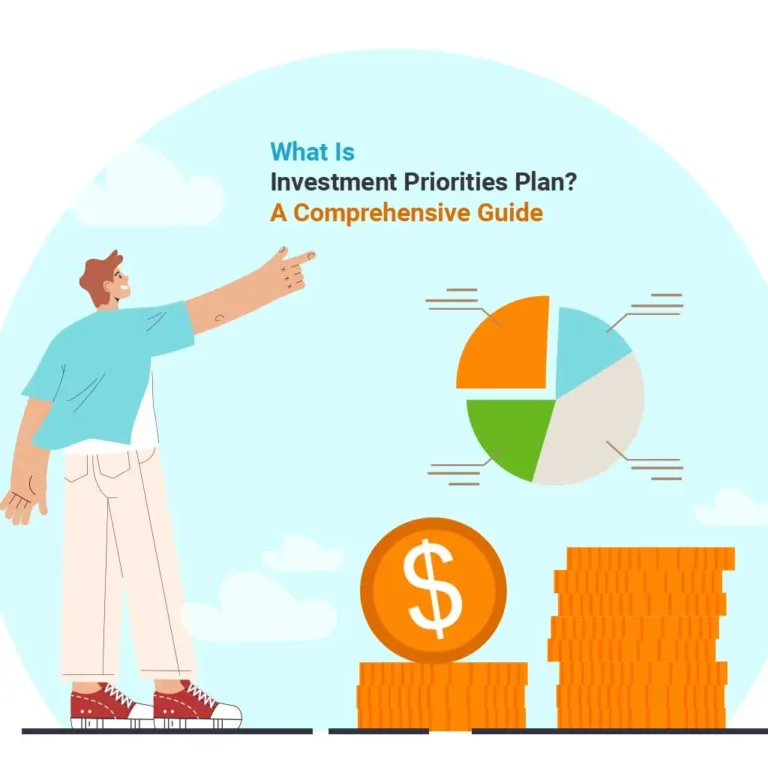Money and Mental Health… ah! Where do I start? In this day and age there seems to be more people suffering from mental health disorders than people who are completely free from them. Whether you are a constant worrier or if you have trouble processing any kind of hardship or negativity in your life, you are not alone.
Adults aren’t the only ones who have problems with money and mental health, children are suffering too. Mainly because of money addiction. . As much as we try to protect our children from the harsh realities of life, they too can face long-lasting trauma due to our negative financial circumstances and choices.
How Are Money Problems Affecting Your Mental Health?

Our inability to manage our money well can often make people go mental or have mental health disorders. If you see a person suffering from depression or excessive anxiety, their financial situation can be one of the main reasons behind it. Funny thing is, a pre-diagnosed mental disorder can also be a reason for anyone to make bad financial decisions and get stuck in a loop.
It is a vicious cycle that usually ends up affecting every member of the family, even the children. In fact, it is the children who are most affected by all the financial mistakes we make.
Managing our money isn’t something that comes naturally to anyone; it is something that needs to be learned and developed over time. Your children can end up making the same mistakes you did that ultimately gave them a stressful childhood, simply because we don’t understand the relationship between money and mental health.
Kids are extremely perceptive. You might think you are sheltering your children from your money problems, but they will pick up on your stress and anxiety in most cases. Trauma symptoms can surface in our children when they feel their safety is threatened by a financial crisis or when their previously secure environment becomes unstable.
How Do Money and Mental Health Problems Affect Your Young Children?
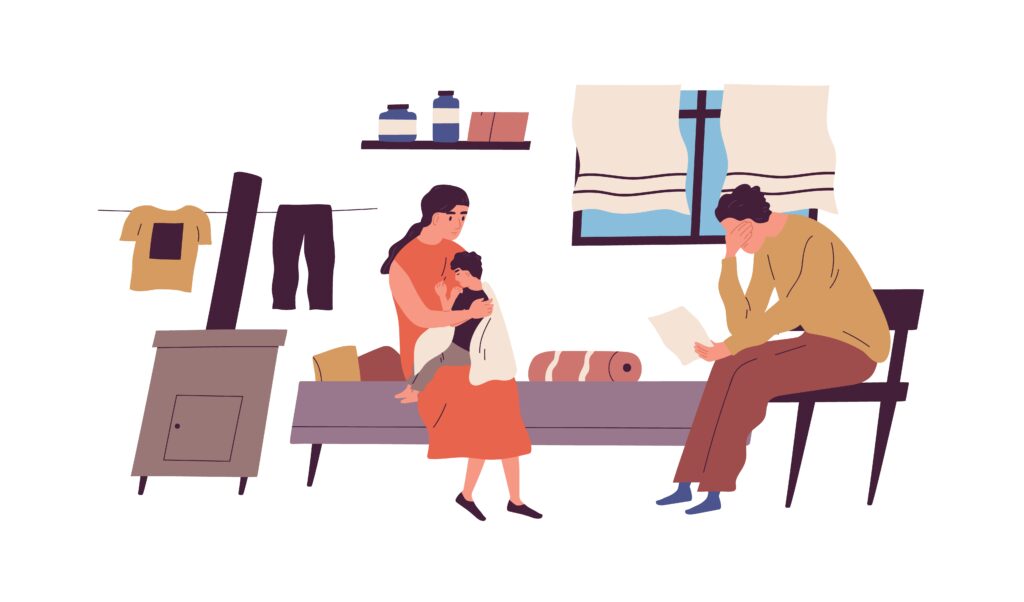
As rebellious as your child or young adult might seem, they need a safe and stable life. Any signs of financial problems, even when you are trying hard to hide them, traumatizes children when their established sense of environment and basic needs are threatened.
Parents suddenly faced with unemployment, losing their home and/or experiencing a change or loss of a certain lifestyle – children usually respond negatively to these signs of financial problems.
It’s not just that money problems may cause your kids to develop money and mental health issues, it can also expose them to other risks.
In very young and adolescent children, financial hardships can actually end up impacting brain development. A child’s brain grows and develops until he/she is in their mid twenties.
Suffering from any kind of financial difficulties during this period can cause self-destructive tendencies in children. They might show signs of being easy to anger and feel the need to find solitude in order to find peace.
Sometimes young children struggle with shame because they belong to a low-income family or group. This can severely hamper their self-confidence and self-worth, and cause signs of self-loathing and despair.
How can we deny the possibility of children getting bullied at school because of wearing hand-me-down clothing and not having the latest toys or tech gadgets?
The problem is most children have the misconception that their self-worth depends on their financial situation in life. Not having enough money to own the same things that their friends take for granted can ultimately become a huge roadblock for their ability to succeed in life.
How Does Debt Affect Your Family?

Debt isn’t always a bad thing. Debt/loans can give you the chance to finish your education and buy the house of your dreams, or even the chance to go on a vacation.
You don’t just accumulate debt by having an extravagant lifestyle. Debt can come about when you suddenly become unemployed or are faced with an illness or an accident resulting in staggering medical bills.
Just like any other kind of financial crisis, large debt and mental health go hand in hand. Something as small as owing someone money can be stressful, especially if you don’t have a definite plan to repay your loan.
In addition, Someone suffering from money and mental health problems is also likely to build up debt, since it is much harder for them to concentrate on their source of income, which just adds more stress to an already difficult financial situation.
Although young children rarely understand the concept of debt, they are very likely to pick up on the stressful and anxious money mood their parents have. Living in an environment where the parents are visibly worrying about something will no doubt hamper a child’s mental and emotional welfare.
How Can Money and Mental Health Problems Affect Your College Aged Child?

College is expensive. For many it is completely impossible to accomplish without taking out a student loan. Your college aged child’s financial situation becomes an additional worry on top of their education, causing students to become even more stressed. Depending on their field of study and availability of work post graduation, the financial burden can be completely overwhelming.
Just as young children are bothered by money problems at home, your college aged child can also be facing a lot of financial pressures in their life. Many students opt for part-time jobs – sometimes, multiple jobs together – which eventually can cause them to burn out and affect the time they need to dedicate to studies. Even after living a frugal lifestyle and working hard while at school, many students graduate with a large amount of debt.
In some circumstances, it becomes very hard for your college aged child to make wise financial decisions and continue their education without falling apart at the seams.
Money and Mental Health: A Comprehensive Study
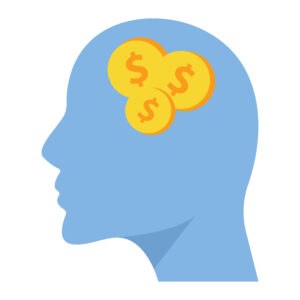
The latest statistics on this matter confirm that, on average, people suffering from money and mental health issues earn $1,000 less every month than people who don’t have these struggles. Whatever the specific reason may be, there is a direct relationship between mental health and income.
According to Money and Mental Health, more than 46% of the population who have a debt to repay have, at one point in time, been diagnosed with at least one form of a mental health issue.
In addition, 86% of the people who have been suffering from and diagnosed with basis mental health issues have, themselves, blamed their financial situation to be the reason behind their mental state.
A survey published by the AspenInstitute on August 02, 2018 titled “The Burden of Debt on Mental and Physical Health” focuses on how 72% of the participants admitted to their mental health declining along with their financial status.
According to this survey, individuals who have to deal with the burden of a large debt are twice as likely to experience anxiety and depression than those who are financially stable. In some extreme cases, insurmountable debt can lead to suicide/attempted suicide.
Frightening scenarios, all of them. Add in a pandemic and the situation becomes more grim.
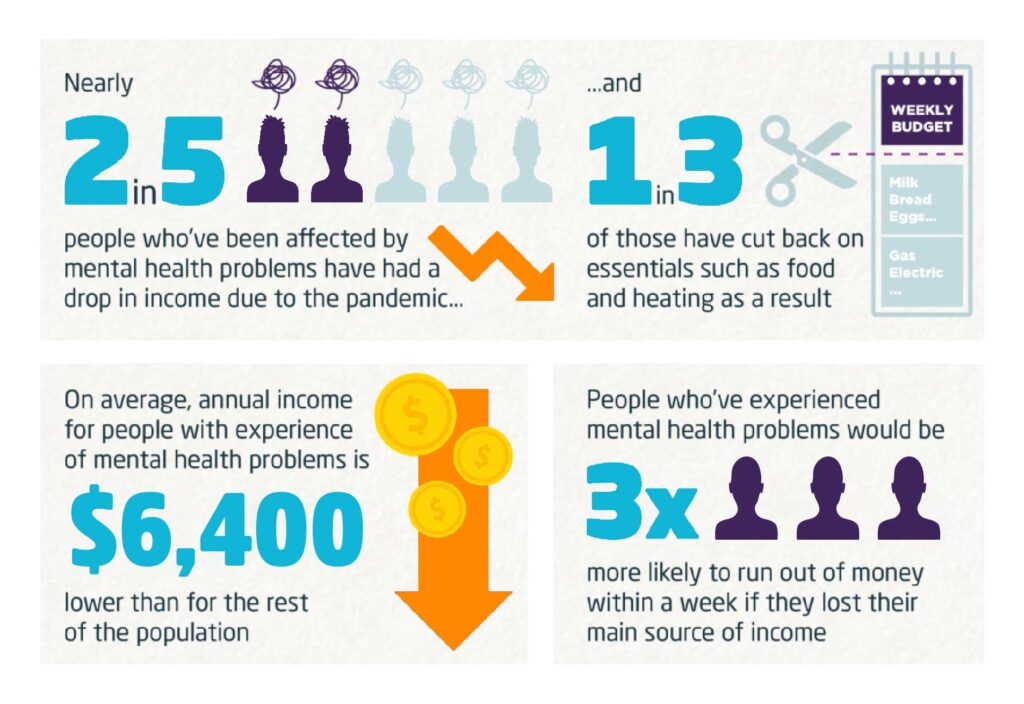
Best Money Moves conducted a report on the impact of financial problems on mental health in 2020, according to which, 90% of Americans blame money for their increased stress levels.
Twenty-five percent of this population have stated they regret their purchases after the fact, and 40% desire for a fresh financial start. Together, that’s an astounding number of people who are extremely stressed about lacking of money.
In the same report, at least 35% of Americans claim to lose sleep due to financial stress and 25% have experienced insomnia, which can in itself lead to additional money and mental health problems.
According to a blog published by the World Bank in February 2021, the Covid-19 pandemic has worsened mental health for millions of people worldwide. More than 1 billion people, especially in the low-income countries, live with mental disorders with very little treatment available.
When you face financial troubles, you’re not the only person suffering. Directly or indirectly, your entire family, especially your young children who are completely helpless in situations like these, suffer from the consequences.
Money Problems and Mental Health Advice
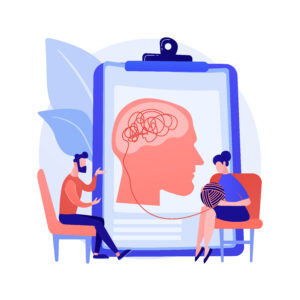
So you’re having some money problems. You are not alone in your financial crisis.
If you are facing a large amount of debt and/or a loan to repay, or if you are in a major financial crisis, it may have come about due to circumstances out of your control.
The post Covid-19 world has seen a lot of unexpected unemployment and medical bills that have bewildered everyone. Adults and children alike, suddenly faced with a reduced lifestyle have experienced acute depression and anxiety worldwide.
However, this shouldn’t be a permanent fixture in your life.
Financial problems are sometimes unavoidable, but what you can control are your reactions to them. Everyone faces money problems at some point in their life; what’s important is how you plan to overcome them.
Here are some suggestions to assist in this process:
Advice number 1. Talk to someone about it
One of the worst things you can do regarding financial problems is to hide it under the guise to “protect your family from the situation” by behaving as if everything is okay.
If there is ever a situation when you need your loved ones’ help and support, it is when you are going through extreme money problems.
Why share if the person you talk to may not have all the answers or be able to fix anything? You share because by simply discussing your problems, you’re unburdening yourself.
You’re allowing someone else to sympathize with you, console you, and in some cases, assist you in a plan to move forward.
In keeping all your troubles to yourself, you’ll be heading towards more money anxiety and stress. Just by the simple act of sharing, you can make anything seem less daunting, less overwhelming and less stressful.
Advice number 2. Explain the situation to your family
You might think your children are too young to understand financial problems, or that it is pointless to tell them because they won’t be able to help you in any way. Sometimes, parents have trouble admitting mistakes have been made.
The reality is different. No matter how much you think you’ve failed your family and your children, they will be forgiving. It takes a big person to admit their mistakes, and kids will appreciate your honesty.
Your family, especially your children, will be relieved to hear the real reason behind your stress, bad moods and anxiety rather than wondering if this was somehow their fault.
There’s another huge reason behind involving your children in your financial situation – children can be involved in cutting back on expenses and learning to help save and strive for the goal of financial security.
If your children are bewildered by a sudden change in their lifestyle, understanding the reason behind the change will help them. While it will still be painful for them to cut back on some things, they will at least understand why.
Knowing you are in this together as a family can significantly help your money and mental health problems, and the mental state of those you love.
Advice number 3. Understand your financial situation
Instead of wasting time over thinking your problems, your time is better spent thinking up solutions. The first realistic step should be to take an account of all of your finances.
It is human nature to respond to our most pressing problems by ignoring them. This can mean unopened bills, ignored bank statements and missed calls from creditors. This shouldn’t continue, because staying in denial of reality will only make your financial situation worse.
Instead, what you need to do is to start taking an inventory of your finances. This will give you a much clearer idea of where you stand, and you’ll be in the position of actually doing something about it.
- Consider all your income, which includes your salary, bonuses and other benefits, interest, child support or alimony.
- Make a list of all your debt, including all loans, identifying how much you owe and what you pay on these each month or each year.
- Keep track of your daily and monthly spending. Include what you have to pay every month on housing, food, transportation and medical. Take special note of all the unnecessary expenditures. Identify if you have any negative spending patterns or reckless spending triggers and eliminate them.
How is this going to help? Even if you are in a very serious financial crisis, you’ll end up feeling more in control just by seeing the full picture. Don’t let money control you. You’ll feel less helpless, and this will free you from excessive stress because at least now you’re doing something about it!
Advice number 4. Have a plan and stick to it
For everything in life, you need a plan.
If your financial situation has suddenly gone downhill, you’ll need a solid plan more than ever. Depending on your situation, your plan can be to get a second job, save more money every month, make a tighter budget or ask your partner or spouse to get a job if they don’t have one.
If you have a large debt with large interest to be paid every month, maybe it makes sense to try and borrow the amount from a family member or a friend. Sometimes, it is helpful to talk to someone with experience who can help you make a better plan.
When you finally have a plan that you can stick to, just know this will take time. Have patience with yourself. However, making a plan is the first step, and it will help you to feel more of a sense of direction. You might still feel stressed about your situation, but you’ll begin to have more confidence in yourself.
Advice number 5: Find Different Ways to Manage Your Money and Mental Health
Even when your financial situation is on track, you’ll need to take care of your mental health. Exercising and spending some quality time with your family helps, and you can do both of these to help with your mental money problems! Some relaxation techniques like breathing exercises and meditation have also been known to help reduce stress.
If you think you might need some professional help regarding your mental state, there are a lot of mental health charities that can help. According to a report published by the National Center for Charitable Statistics in 2020, there are around 1.5 million non-profits in the US that help people who need mental care. Among them, most notable are:
- The National Alliance on Mental Illness (NAMI) that helps families affected by mental illnesses.
- To Write Love on Her Arms (TWLOHA) which helps people with depression, suicidal thoughts and addiction.
- Mental Health America (MHA) which has impacted more than 31 million people through their education programs and.
- The JED Foundation that works mainly with teens and young adults.

Wherever you are in life, there’s one thing that you definitely shouldn’t do: blame yourself. Whether your financial situation is stressful because of a mistake, overspending, or whether you were a victim of negative financial circumstances due to the pandemic, it never improves the situation if you keep blaming yourself.
It is quite normal to feel stressed over money matters. As long as you can begin to open up and share with family and friends and create and focus on a plan to change your situation for the better, the mental health for you and your children will begin to improve.






